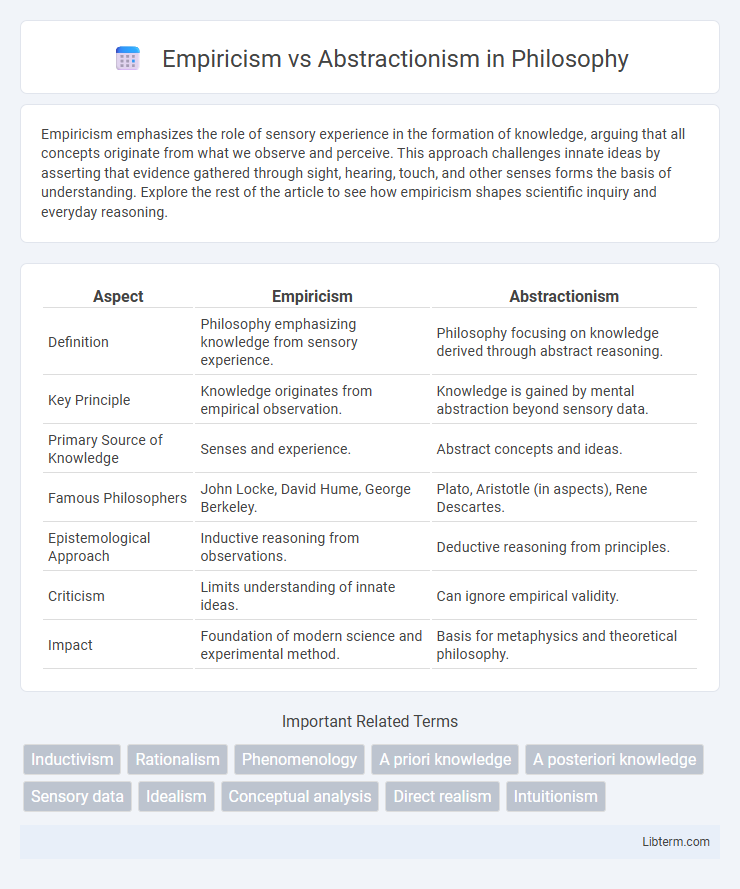Empiricism emphasizes the role of sensory experience in the formation of knowledge, arguing that all concepts originate from what we observe and perceive. This approach challenges innate ideas by asserting that evidence gathered through sight, hearing, touch, and other senses forms the basis of understanding. Explore the rest of the article to see how empiricism shapes scientific inquiry and everyday reasoning.
Table of Comparison
| Aspect | Empiricism | Abstractionism |
|---|---|---|
| Definition | Philosophy emphasizing knowledge from sensory experience. | Philosophy focusing on knowledge derived through abstract reasoning. |
| Key Principle | Knowledge originates from empirical observation. | Knowledge is gained by mental abstraction beyond sensory data. |
| Primary Source of Knowledge | Senses and experience. | Abstract concepts and ideas. |
| Famous Philosophers | John Locke, David Hume, George Berkeley. | Plato, Aristotle (in aspects), Rene Descartes. |
| Epistemological Approach | Inductive reasoning from observations. | Deductive reasoning from principles. |
| Criticism | Limits understanding of innate ideas. | Can ignore empirical validity. |
| Impact | Foundation of modern science and experimental method. | Basis for metaphysics and theoretical philosophy. |
Introduction to Empiricism and Abstractionism
Empiricism emphasizes knowledge derived from sensory experience and observable evidence, centering on data collection and experimentation to form concepts. Abstractionism, conversely, prioritizes the mind's ability to extract general ideas from specific instances, highlighting mental processes that simplify complex information into abstract representations. Both approaches underpin cognitive theories but differ fundamentally in grounding knowledge either in external reality or internal conceptualization.
Historical Origins and Philosophical Foundations
Empiricism originates from the 17th-century scientific revolution, emphasizing knowledge through sensory experience as seen in the works of John Locke and David Hume. Abstractionism, rooted in Platonic philosophy, asserts that abstract concepts and ideas exist independently of sensory experience, influencing later metaphysical and epistemological theories. Both frameworks address the nature of knowledge but diverge on whether empirical observation or innate ideas constitute the foundation of understanding.
Core Principles of Empiricism
Empiricism centers on the core principle that knowledge is primarily derived from sensory experience and empirical evidence rather than innate ideas or purely abstract reasoning. It emphasizes observation, experimentation, and the scientific method as fundamental tools for acquiring and validating information. This approach contrasts with abstractionism, which prioritizes conceptual thought and theoretical constructs independent of direct sensory input.
Key Concepts in Abstractionism
Abstractionism centers on the idea that knowledge arises from the mind's ability to extract common features from sensory experiences, forming universal concepts beyond direct observation. Key concepts include innate ideas, mental representations, and the role of intellectual intuition in grasping abstract entities. This approach contrasts with empiricism by emphasizing mental synthesis over empirical induction in the acquisition of knowledge.
Comparison of Approaches to Knowledge
Empiricism emphasizes knowledge derived from sensory experience and observation, relying heavily on evidence and experimentation to form conclusions. Abstractionism centers on knowledge obtained through conceptual reasoning and mental models, focusing on theoretical frameworks and symbolic representation. Comparing these approaches reveals empiricism's focus on concrete data and abstractionism's reliance on abstract concepts to understand reality.
Influential Thinkers and Their Contributions
John Locke and David Hume are key figures in Empiricism, emphasizing sensory experience as the foundation of knowledge and shaping modern scientific inquiry. In contrast, Immanuel Kant bridged Empiricism and Abstractionism by proposing that while knowledge begins with experience, the mind actively organizes sensory input through innate concepts. Friedrich Wilhelm Joseph Schelling further advanced Abstractionism by highlighting the role of the mind's creative power in forming abstract ideas beyond mere sensory data.
Empiricism vs Abstractionism in Science
Empiricism in science emphasizes knowledge derived from sensory experience, observation, and experimentation as the foundation for understanding phenomena, prioritizing measurable data and evidence-based conclusions. Abstractionism, on the other hand, centers on conceptual models and theoretical frameworks that distill complex realities into simplified, generalized ideas, facilitating hypothesis formation and broader interpretation. The scientific method often integrates empiricism's reliance on observable evidence with abstractionism's use of models to explain and predict natural laws and behaviors.
Impact on Modern Philosophy and Thought
Empiricism's emphasis on sensory experience as the foundation of knowledge revolutionized modern philosophy by prioritizing observation and experimentation, directly influencing the development of the scientific method. Abstractionism contributed by encouraging the use of conceptual frameworks and innate ideas, shaping fields like metaphysics and epistemology through theories that go beyond immediate empirical data. Together, these approaches forged a comprehensive intellectual landscape, balancing concrete evidence with abstract reasoning in contemporary philosophical discourse.
Strengths and Weaknesses of Each Perspective
Empiricism excels in grounding knowledge through sensory experience and evidence, promoting objectivity and verifiability, but it struggles with abstract concepts that lack direct empirical observation. Abstractionism enables the exploration of theoretical ideas and general principles beyond immediate experience, fostering innovation and conceptual clarity, yet it can lead to speculative conclusions detached from practical reality. Balancing empirical data with abstract reasoning is essential for comprehensive understanding and scientific progress.
Conclusion: Bridging Empiricism and Abstractionism
Bridging empiricism and abstractionism requires recognizing the complementary strengths of sensory experience and conceptual reasoning in knowledge acquisition. Empiricism grounds understanding in observable evidence, while abstractionism enables the formation of general principles beyond immediate perception. Integrating these approaches fosters a more comprehensive epistemology that leverages both concrete data and abstract frameworks for deeper insight.
Empiricism Infographic

 libterm.com
libterm.com